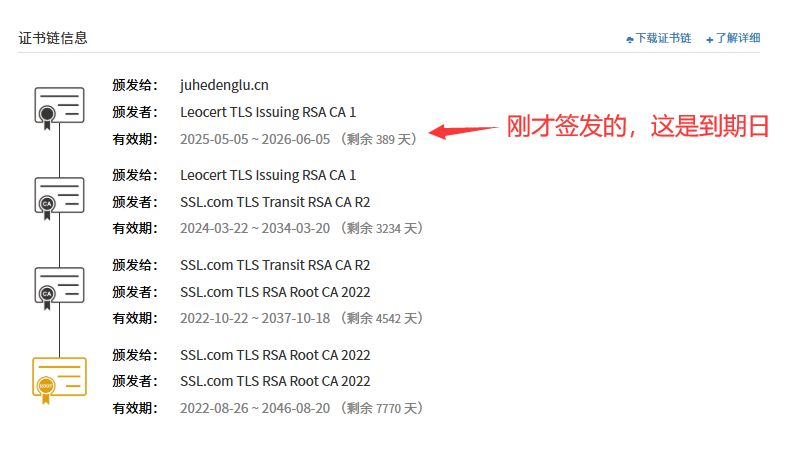在了解根证书和服务器SSL证书有效期前得先知道他们是什么。
什么是根证书?
根证书是指CA机构颁发SSL证书的核心,是信任链的起始点。每个浏览器都有根证书库,有的浏览器是采用自主的根证书库,而一些浏览器则使用第三方的根证书库。根证书库是下载客户端浏览器时预先加载根证书的合集。因此根证书是十分重要的,因为它可确保浏览器自动信任已使用私钥签名的SSL证书。
什么是服务器SSL证书?
SSL服务器证书是一种配置在服务器上数字证书,它遵守 SSL协议,通过受信任的数字证书颁发机构CA,在服务器身份验证通过之后进行颁发,具有服务器身份验证和数据传输加密的功能。
CA机构不会直接使用根证书签发服务器SSL证书,因为这种操作存在风险性。如果发生错误颁发或者需要撤销根证书,则使用根证书签名的每个证书都会将不受信。所以又创建了中间证书。CA拥有很多中间证书,但是根证书数量比较有限,猜测是为了方便管理、并存储置入浏览器和设备中吧。
根证书与SSL证书有效期时长是多久?
我们查看网站安全证书的有效期,一般可以直接点击地址栏旁的安全锁就可以看见该网站SSL证书的有效期。
如何查看根证书、中间证书、SSL证书有效期?
但是要查看该SSL证书链上的根证书和中间证书的有效期,可以用SSL证书检测工具,可以看到完整证书链信息,包括他们的有效期时长。
如上图,SSL Corporation根证书的有效期20多年,中间证书也是10多年,并附上了剩余时长。而最终网站使用的服务器SSL证书的有效期是1年多一点。
为什么是1年多一点?原因在于CA/B论坛最新规定了SSL证书的有效期时长不能超过398天,部分CA是1年的有效期,然后有赠送了30天有效期,比如香港云SSL证书。
不管哪个CA签发的SSL证书,根证书和中间证书的有效期都比最终SSL证书时长短。根证书和中间证书的有效期一般是10年,而SSL证书的有效期是1年,缩短SSL证书的有效期目的是为了提升网站的安全性。这也是服务器SSL证书的职能所在!

